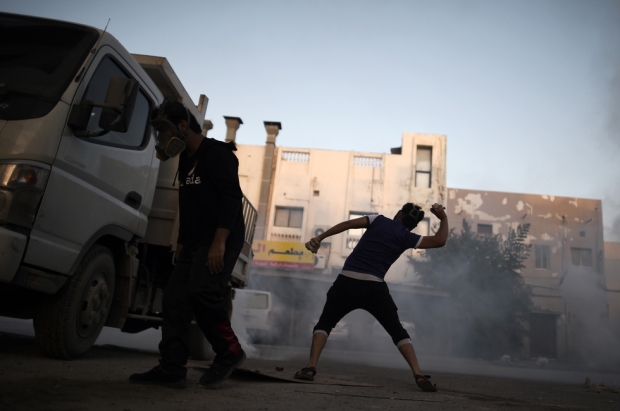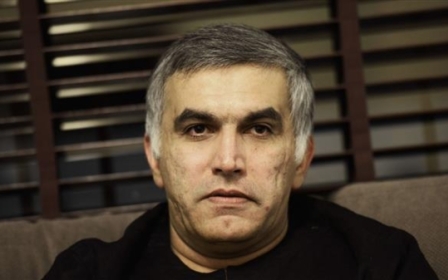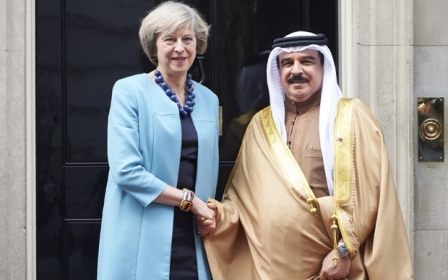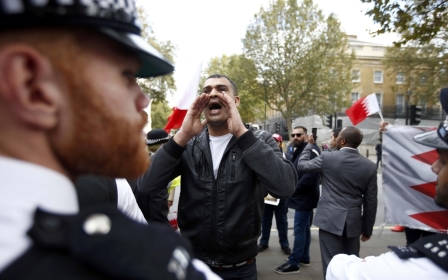UK trains Bahraini troops as May puts trade before human rights
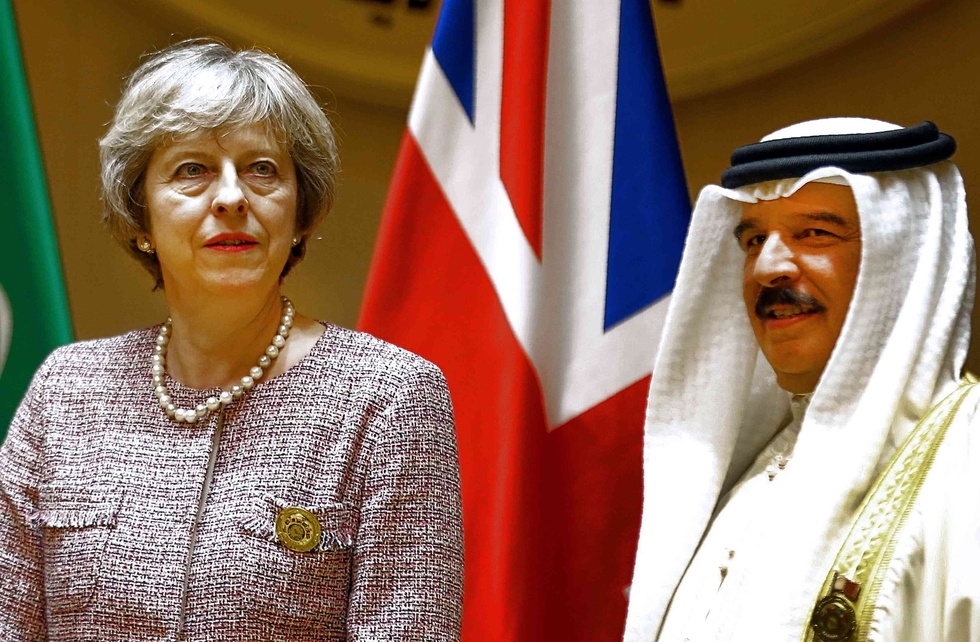
British commandos trained Bahrain’s security forces in small arms and sniping tactics just two days after Prime Minister Theresa May said Britain would not “snipe” from the sidelines over human rights concerns in the county, Middle East Eye can reveal.
An investigation by MEE has revealed that the controversial training for Bahraini forces - which violently put down pro-democracy protests during the Arab Spring in 2011 - took place during Pearl Dagger 2016, an infantry exercise held in the country in December.
To the dismay of rights campaigners, who point to Bahrain’s detention of democracy activists and a ban on Al Wefaq, the major opposition party, an expanded Pearl Dagger amphibious exercise was used as a cover for small arms drills, and most controversially, the demonstration of cutting-edge British-built Accuracy International sniper rifles.
It was attended by senior British officers, as well as Lieutenant-General Dhiyab bin Saqr Al-Nuaimi, the chief of staff for the Bahrain Defence Force (BDF).
Despite human rights concerns, Liam Fox, the international trade secretary, and many Conservative MPs believe a trade deal with the Gulf could be one of the first the UK can seal post-Brexit.
READ: Questions need to be answered about Bahrain and the IISS
The latest figures show Britain has sold Bahrain £51m of arms (at least $62m), including Accuracy International sniper rifles and other small arms, since the popular uprising was crushed by security forces in 2011, according to the Campaign Against Arms Trade (CAAT).
During her visit to Bahrain, May spoke from the deck of the UK’s flagship HMS Ocean, which was deployed to the region to take part in Pearl Dagger 2016. She was flanked by Jackal armoured vehicles as she addressed British troops and later told journalists that Britain needed to “engage” with Bahrain and the Gulf states rather than just “sniping from the sidelines”.
May faces more criticism
But despite her promise to address human rights alongside trade, the British leader is now facing renewed criticism for putting post-Brexit trade deals with the region above rights concerns in Bahrain and Saudi Arabia.
Emily Thornberry, Labour's shadow foreign secretary, has demanded a halt to the controversial training.
Thornberry told MEE: “People will be dismayed to learn that our elite commandos are still training the very sniper units in Bahrain which targeted their own civilians in the last uprising.
'People will be dismayed to learn that our elite commandos are still training the very sniper units in Bahrain which targeted their own civilians in the last uprising'
- Emily Thornberry, Labour's shadow foreign secretary
“It is yet another example that when trade deals and security alliances are on offer in the Middle East, Theresa May's government puts any concern for human rights out of the window.”
Labour’s call follows demands for an investigation after it was revealed in April 2016 that Britain was offering week-long training courses to Bahrain snipers.
A spokesperson for the Ministry of Defence declined to comment on the nature or timing of the exercises, but said that the use of sniper rifles was “purely a demonstration of UK equipment during an official visit”.
They added: “The UK enjoys close links with Bahrain, spanning 200 years, which reinforce our commitment to the Gulf region.”
'Time for UK to be tough on human rights'
However, campaigners are particularly concerned about military training in Bahrain as they accuse the Sunni-dominated government of using snipers to target protesters during anti-government protests in 2011. They also point out that the country’s largest political party was banned from the GCC summit.
On Monday, a court in the country upheld the death sentence against three men accused of killing three policeman in 2014. Campaign groups say the men are victims of torture and received an unfair trial. Bahrain and Saudi Arabia have also been heavily criticised for their bombing campaign in the Yemen civil war.
'The government might say that it is not 'sniping from the sidelines' but it is actively complicit in the ongoing crackdown in Bahrain'
- Andrew Smith, Campaign Against Arms Trade
Andrew Smith, a spokesperson for the Campaign Against Arms Trade (CAAT), said: “The government might say that it is not 'sniping from the sidelines' but it is actively complicit in the ongoing crackdown in Bahrain. By providing political and military support and training it is actively strengthening the regime and endorsing it.”
Bahraini opposition activists are also concerned by Bahraini state media reports which suggest that the British training was observed by paramilitary and police officers, including officers from the Royal Special Force and police commander Brigadier General Jassem Al Ajaj.
READ: Bahrain's five-year plan of repression
Sayed Ahmed Alwadaei, director of advocacy at the Bahrain Institute for Rights & Democracy, told MEE: “Time and again, Britain has excluded human rights for security relations. May's government say they engage on human rights quietly and provide assistance, but the crisis in Bahrain worsened over the last year and is set to get worse in 2017.
“It's time for Britain to be tough on human rights, rather than giving Bahrain the tools of repression.”
Middle East Eye propose une couverture et une analyse indépendantes et incomparables du Moyen-Orient, de l’Afrique du Nord et d’autres régions du monde. Pour en savoir plus sur la reprise de ce contenu et les frais qui s’appliquent, veuillez remplir ce formulaire [en anglais]. Pour en savoir plus sur MEE, cliquez ici [en anglais].


